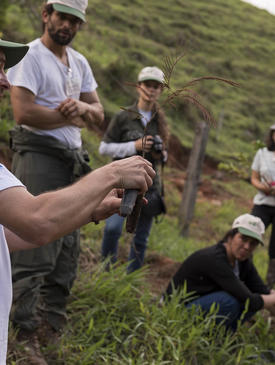Sustainable Production in Agricultural Landscapes of the Cantareira System
Summary
The Cantareira System is located in São Paulo and Minas Gerais states and is one of the largest water systems on the planet. This system has the capacity to produce 33,000 liters of water per second and is responsible for supplying water to more than 7.6 million people. The Cantareira system the system also has an enormous ecological importance as it shelters many endangered species and connects two forest massifs of the Atlantic Forest, the Cantareira and Mantiqueira. However, inadequate land use puts great pressure on these areas: 59 percent of the Cantareira are anthropic areas, usually degraded pastures. IPÊ developed the "Sowing Water" in the Cantareira System to (i) influence farmers to adopt sustainable land-use practices and to restore the forest that has been suppressed and (ii) involve, through environmental education, residents of the Cantareira area as instrumental stakeholders of the project.
In partnership with the "Sowing Water" project, ELTI created a field course for farmers that will give them specialized training on sustainable production and forest restoration, focusing on the potential to increase productivity while using natural resources in a sustainable manner. The course will take place in Camandaucaia, Itapeva and Extrema, at Minas Gerais, where experts will present sustainable production practices to farmers and extension agents and help them to elaborate a plan to start these practices on their own properties. The central topics will be agroforestry, ecological pasture management, silvopastoral systems, Brazilian forest legislation and forest restoration.
Content
Module 1: Agroforestry
March 23, 2019 – Camanducaia, Minas Gerais
- Overview of the Cantareira System
- Syntrophic farming with Karin Hanzi (“Epicentro Dalva”)
- Assembly of an agroforestry plot
Module 2: Pasture management and silvopastoral systems
March 27, 2019 – Itatiba and Extrema, Minas Gerais
- Ecological pasture management and visit to a demonstration unit
- Silvopastoral systems
- Native forestry
- Brazil forest legislation
Module 3: Forest restoration and exercise
April 03, 2019 – Extrema, MG
- Forest restoration: principles and applications
- Visit to a restoration site at Conservador das Águas Project
- Property planning exercise


